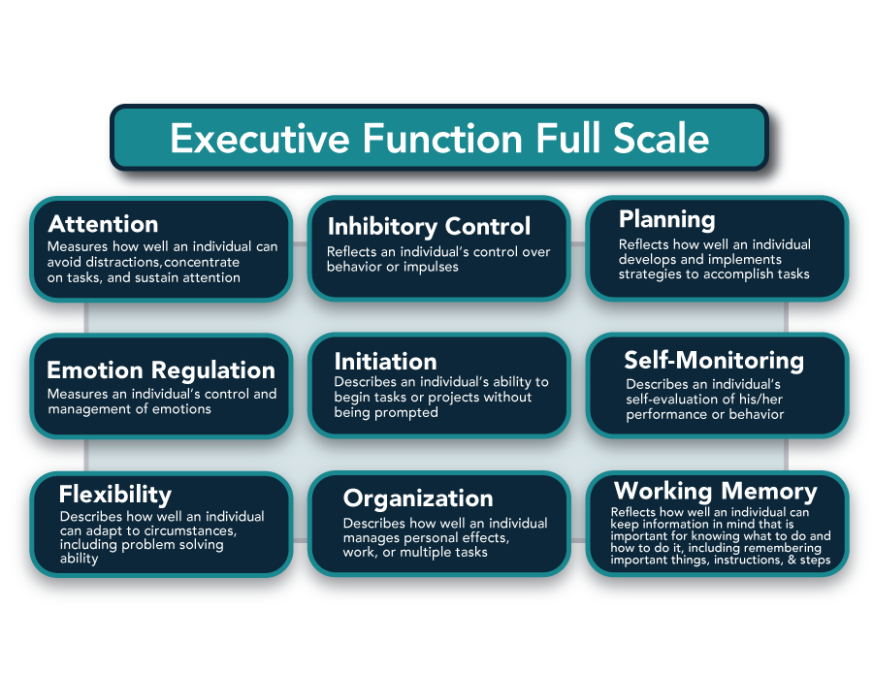The Importance of Assessing Executive Function Across the Lifespan
Children and adults with problems related to executive functioning may struggle to organize materials, regulate emotions, set schedules, and stick with tasks. For example, they misplace papers, reports, and other school materials. They might have similar problems keeping track of their personal items or keeping their bedroom organized.
Dr. Sam Goldstein and Dr. Jack A. Naglieri’s Handbook of Executive Functioning (2014) defines executive function as “…an umbrella term used for a diversity of hypothesized cognitive processes, including planning, working memory, attention, inhibition, self-monitoring, self-regulation, and initiation carried out by prefrontal areas of the frontal lobes” (Goldstein et al., 2014, p. 3). It involves real-time adaptation to external demands rather than a passive response to information (Reynolds & Horton Jr., 2014).
An article by Medical News Today specifies that executive function-related issues are generally an outcome of other neurological, mental health, and behavioral disorders. Depression, Alzheimer’s, Dementia, Attention-deficit/hyperactivity disorder (ADHD), anxiety, Autism Spectrum Disorder, or a traumatic brain injury (TBI), among other diagnoses, may contribute to executive function deficits. It is important to evaluate an individual’s deficits in executive function, as well as the underlying causes of the deficits, as they can hinder one’s ability to perform tasks at different stages of life.
How does executive function develop in children?
Executive function in youth relies on the quality of a child’s early growth. Goldstein and Naglieri’s handbook introduces a neurodevelopmental model proposing five stages of human development. This model provides insight into early changes in the brain. The fourth stage (ages 7-8) is crucial for developing complex mental abilities as the mind begins to make sense of its environment (Goldstein et al., 2014). This developmental step is followed by the fifth stage (ages 8+), where the frontal lobes are involved in processes and support functions such as abstract thinking and intentional memory (Goldstein et al., 2014). According to the Center on the Developing Child, executive function and self-regulation skills are applied when three areas of brain function, including working memory, mental flexibility, and self-control work together towards tasks like:
- retaining information
- responding to different demands
- resisting impulsive actions
Childhood is a crucial time to support the development of executive function skills. An article by the Center on the Developing Child outlines tactics for supporting a child during this process, which include:
- establishing routines
- modeling social behavior
- nurturing healthy relationships
- engaging in creative play
- preparing for independency
How does executive function affect adults?
Once transitioned into adulthood, executive function influences how an individual performs independently at work or home. Consider someone who often misplaces items, finds it challenging to work towards a deadline, or perhaps is known to become easily irritated. This person may be experiencing executive function deficits.
Adults with executive function deficits may end up impaired academically (e.g., lower grades or less likely to graduate from college), occupationally (e.g., lower work performance, more firings), and socially (e.g., marital dissatisfaction, having fewer friends). Individuals may also be at higher risk of mismanaging their finances and engaging in risky behaviors (e.g., risky sexual behaviors or risky driving). Importantly, having deficits in executive function does not mean that these impairments are inevitable. It is critical that individuals struggling with these deficits are properly assessed so that treatments and interventions can be implemented.
Why should you measure executive function across the lifespan?
Executive function assessments for youth and adults can help address developmental concerns at various stages of an individual’s life. Firstly, consider the scenario of a child that is performing poorly at school. Cognitive processing skills that are essential to academic learning are commonly weak areas in people with deficits in executive function, including:
- factual memory that depends on working memory; and
- concept formation that depends on flexibility and novel problem-solving (Castellanos et al., 2018)
Due to this connection, cognitive processing skills are often included in executive function assessment in children (Castellanos et al., 2018). Thus, considering the use of an executive function assessment can prevent misconceptions a parent/guardian or teacher may have about gaps in a child’s performance. The assessment allows for targeted intervention to help the child succeed.
With early assessment and intervention, executive function can improve into young adulthood. However, with age one can eventually witness a performance decline. Starting from the mid-twenties, an individual may experience decline in “…the biological framework of thinking and reasoning” (Princiotta et al., 2014, p. 151).
The prefrontal cortex (PFC), known as the control center for executive function, is found to be vulnerable to gradual aging and one of the first areas of the brain to show signs of degeneration (Princiotta et al., 2014). It is proposed that when the “normal” aging brain changes physical structure, changes can also be seen in executive function (Princiotta et al., 2014). The opportunity to measure executive function and detect and monitor areas of improvement across the lifespan promotes a better-informed approach to one’s health and personal development. MHS offers the Comprehensive Executive Function Inventory™ (CEFI®) and the Comprehensive Executive Function Inventory™ Adult (CEFI® Adult) that enable the opportunity to measure executive function strengths and weaknesses across the lifespan.
A brief look at the CEFI and the CEFI Adult
As described by its authors, Dr. Jack A. Naglieri and Dr. Sam Goldstein, the goal of the CEFI “was to create a rating scale to evaluate behaviors associated with executive function” (Naglieri & Goldstein, 2014, p. 233). It can be administered across the lifespan with versions available for youth and adults.
The CEFI and CEFI Adult are the most representative nationally standardized behavior rating scales built to measure and evaluate executive function strengths and weaknesses. Both the CEFI and CEFI Adult allow for multi-rater perspectives on an individual’s executive function strengths and weaknesses. The CEFI can be completed by a parent or teacher rating youth ages 5 to 18 years and allows for the option of self-reporting as well (for ages 12 to 18 years), and the CEFI Adult has self-report and observer forms for rating individuals aged 18 years and older. The CEFI and CEFI Adult both include:
- A Full Scale score that provides information on one’s general level of executive function.
- Nine CEFI scales that identify strengths and weaknesses in executive function and areas for intervention
(see Figure 1). - The ability to generate three user-friendly online reports that can be easily communicated. These reports include an Interpretive Report, a Comparative Report to allow for a multi-rater comparison of scores, and a Progress Monitoring and Treatment Effectiveness Report to monitor changes in scores over time.

The CEFI and CEFI Adult are valuable tools for a variety of settings that can be used during:
- diagnostic evaluations
- intervention strategies
- response to intervention programs
- individualized education plans (IEP)
Curious to learn more?
Click here for more information on the CEFI.
Click here for more information on the CEFI Adult.
References
Castellanos, I., Kronenberger, W. G., & Pisoni, D. B. (2018). Questionnaire-based assessment of executive functioning: Psychometrics. Applied neuropsychology. Child, 7(2), 93–109.
Center on the Developing Child at Harvard University. (2020, March 24). Executive Function & Self-regulation.
Retrieved December 16, 2022.
Goldstein, S., & Naglieri, J.A. (Eds.). (2014). Handbook of Executive Functioning. © Springer Science+Business Media. doi:10.1007/978-1-4614-8106-5_2
Center on the Developing Child at Harvard University. (2020, October 29). Inbrief: Executive function. Retrieved December 16, 2022.
MediLexicon International. (n.d.). Disordered executive function: Symptoms, causes, and treatment. Medical News Today. Retrieved December 16, 2022.
Naglieri, J. A., & Goldstein, S. (2013). Comprehensive Executive Function Inventory™ (CEFI®). Multi-Health Systems Inc.
Naglieri, J. A., & Goldstein, S. (2017). Comprehensive Executive Function Inventory Adult™ (CEFI Adult™). Multi-Health Systems Inc.










